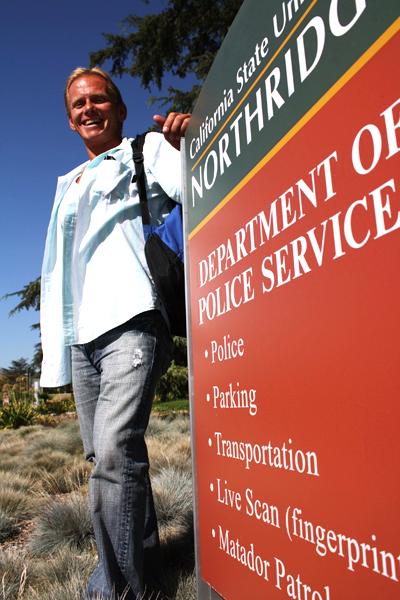
He tested positive for HIV in 1992, was paroled in 2007 and as a result 41-year-old Michael Dilley has tried to help others combat addiction and prevent HIV.
“Like four months after my diagnosis I was in a school talking about it,” said Dilley, a health education student.
Since Dilley was paroled in December of 2007, he has been working with the Tarzana Treatment Center, the largest taxpayer supported treatment facility in Los Angeles. Dilley was reluctant to discuss his arrest and subsequent parole violation but alluded to committing a crime to support his drug habit.
“They educate the community,” Dilley said. “I am an addict and alcoholic with 21 months in the program. I successfully discharged my parole of 21 months three weeks ago.”
Dilley attributed his behavior and propensity toward petty crime to drugs.
“It was over the need for more or the perceived need for more,” he said. “I was stuck in a rut for a long time.”
Before Dilley’s HIV diagnosis, he hadn’t committed any crime.
“It’s not an excuse, but I was married, just had my second daughter and I find out that I was positive and my whole life just — yeah, I gave up,” Dilley said. “I went back to what I knew, which was drugs, and it went off crazy.”
He was in San Joaquin Valley when he got the diagnosis.
“Out in the middle of nowhere,” Dilley said. “Daughters are negative, ex-wife didn’t get it … I don’t know why, (but) thank God.”
He spoke about how the HIV was affecting his mind in terms of making him fearful of other people. When Dilley walked into the Daily Sundial newsroom he said he was afraid to shake my hand because of what I might’ve thought of him for having HIV.
“I was aware of that,” he said. “He’s reaching his hand out to me, he knows I’m positive, but that’s OK. It’s always there, little things like that.”
Dating is a particularly difficult for Dilley because of the fact that he has to disclose his HIV status.
“Do you only date positive people?” Dilley said. “There’re positive (Web) sites. The fear of if you do fall in love with someone that’s negative — what if the condom breaks? What if something happens? Because everyone wants to share their life with someone.”
Dilley didn’t hold a baby for some 10 years after his diagnosis, he said.
“Just for the fear that this person might find out, ‘Oh, he’s positive, he held my baby.’”
After visiting a free dating Web site last year, Dilley met a woman and carried on a relationship for about a month.
“We’re still friends,” he said. “It was my first Internet date, my first date in a long time.”
Dilley has never had sex without first telling his partner that he was HIV positive.
“But it’s difficult,” Dilley said. “So, I told her. And she was taken aback, She shared something about her, which wasn’t HIV, but she decided it was OK. We decided to take precautions.”
It’s a fear of rejection that Dilley carries with him, he said.
“Without the 12-step recovery program in my life, I would not be able to face the fears I faced in these two years,” Dilley said. “I would not (have) been able to go to school, get a job, work out on parole, all these fears — but the 12-step program has helped me so much.”
Dilley’s mother had all but disowned him two years ago, but is now visiting him.
“I earned her distrust,” said Dilley. “My daughters, who I haven’t talked to in five and a half years — I went to my daughter’s high school graduation. We text now back and forth.”
Dilley has been continuously in and out of drug use.
“A relationship would go bad and I’d go back to what I knew—that was drugs,” Dilley said.
Attending Alcoholics Anonymous meetings and events, for a long time Dilley never did all of the things that the program dictated for recovery.
“I was too smart, I figured I only needed to do certain steps,” Dilley said.
It was the work that he didn’t think he had to do. Recovery is work, Dilley said.
“I did all those things this time,” said Dilley. “With those twelve steps and that sponsor, I changed on the inside.”





